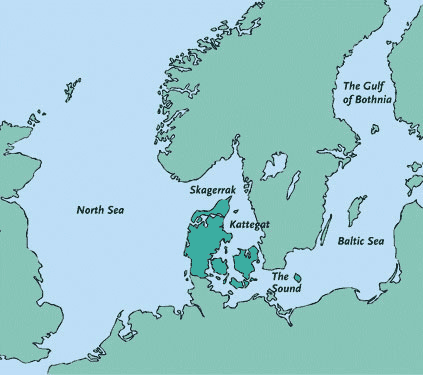Towards a Cleaner Marine Environment
11. International marine collaboration
The sea knows no boundaries - and neither does pollution. Minor contamination of our harbours is not merely a question of stopping our own discharges in Denmark. Rivers from many parts of East and Central Europe flow into either the North Sea or the Baltic Sea, with their content of nutrients and other environmentally harmful substances. Similarly, the atmospheric fallout that contaminates Danish waters has its origins all over Europe. In addition, there are the impacts of discharges from international shipping and oil spills. International collaboration is, therefore, quite decisive to our endeavours to obtain an unpolluted sea.
An unpolluted marine environment
Denmark's goal is that its clean-sea programme be completed by no later than 2020. This is also called a "generation goal," because Denmark - and the other North-Sea countries - have given themselves 25 years in which to attain the targets, starting from 1995. One of these targets is a marine environment without environmentally harmful substances, in which the occurrence of heavy metals has been brought down to the natural environmental background level. Another target is that the occurrence of nutrients be brought down to a level ensuring that oxygen depletion and toxic algal blooming only occur as the result of natural conditions.
Marine conventions pave the way
These ambitious goals have their origins in the North-Sea conferences, at which the ministers of participating countries meet regularly, and in the international marine conferences, OSPAR and HELCOM (see the sidebar), at which the countries around the Kattegat, Baltic Sea and North Sea have described their strategies for a better marine environment.
| The OSPAR Convention - has the task of formulating agreements on protecting the entire North-East Atlantic region, including the Kattegat, against all forms of pollution. This convention has been signed by all EU Member States, as well as Iceland, Norway and Switzerland. |
| HELCOM Convention - has the task of formulating agreements on protecting the Baltic Sea, including the Kattegat, and has been signed by the EU and the countries surrounding the Baltic Sea. HELCOM also covers shipping and is working, e.g., to improve harbour reception facilities for handling ships' waste and cargo residues. |
The regional collaboration on protection of the environment serve as beacons for the individual countries' environmental legislation and initiatives in the marine area. The agreements are of major political significance to these countries' national regulation of marine pollution. There is also broad co-operation on marine policy between the EU and OSPAR. Denmark gives high priority to the work of these conventions, e.g., by drafting new proposals for decisions and by leading the way, through incorporation of the agreements into Danish environmental legislation. Together with a Danish effort, the international marine agreements are crucial factors on the path to a clean marine environment. The goal of handing down an unpolluted sea to the next generation demands the backing of politicians and citizens alike.

| New initiatives in regional forums on co-operation · Reassessment of discharges from the reprocessing of nuclear fuels. · Better reception facilities in harbours. · Landing of decommissioned production platforms. · Design of on-going environmental-status reports from signatory countries. · Protection and preservation of ecosystems and biodiversity. · Selection and prioritisation of the environmentally hazardous substances that we must stop discharging. · Integration of environmental and sectorial policies, including policies on fisheries. |